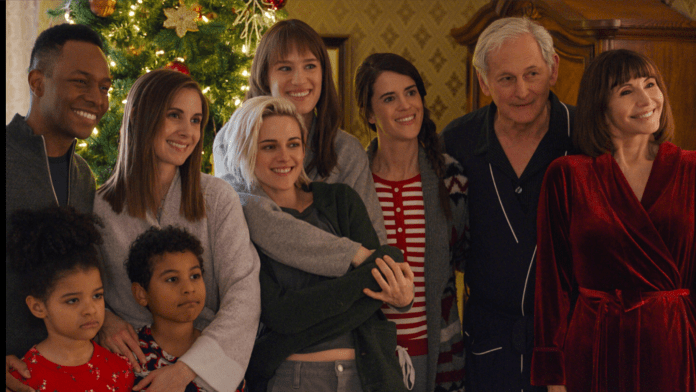Contains spoilers for the film.
Holiday cheer mixed with gay stereotypes when Hulu debuted the holiday rom-com called “Happiest Season” on Nov. 25. Directed by Clea DuVall, this movie offers traditional holiday hijinks, but with a lesbian twist. Kristen Stewart and Mackenzie Davis star as the film’s leading couple in a fresh relationship. The movie begins and we learn of Abby’s (Stewart) disdain for the Christmas holiday, due to the fact that she was orphaned at 19 and hasn’t had a family Christmas since.
Harper (Davis) haphazardly invites Abby to her family’s Christmas weeklong gathering. Abby is hesitant, but warms to the idea, eventually getting excited about the prospect of meeting Harper’s parents after having dated for a year.
When the two have almost arrived at Harper’s parents house, Harper comes clean about the fact that she lied to Abby about coming out to her family over the summer. In fact, she has told her family that Abby is simply her roommate with nowhere to go on Christmas. It feels like a tired cliché that the film centers around a coming out story. The movie would have been more interesting had it focused on other aspects of queerness. Queer people are more than just their coming out stories.
The viewer grows increasingly frustrated with Harper because she continually neglects Abby in favor of appeasing her meddling perfectionist parents. Harper’s dad, played by Victor Garber, is running for mayor of their town and must put on a perfect front. Because of their ambitions, Harper’s parents have always put pressure on Harper and her two sisters to be the spitting image of perfection. This gives some insight into why Harper is afraid to come out. She reveals her relationship with her parents to be transactional, which explains why she is so stressed about impressing them.
Being afraid to come out to conservative parents is one thing, but Harper’s treatment of Abby is cruel. She falls back into the heteronormative charade that she played back in high school, flipping her hair in front of her high school ex-boyfriend while Abby watches from afar.
The movie follows the typical holiday rom-com formula. Though it is noteworthy that the main couple is a queer couple, the film doesn’t break any barriers. Harper and Abby are two white, upper-middle class, thin, able-bodied women whose story has been told before. There’s nothing radical about this movie, in fact it is a perfect rom-com because it doesn’t promise anything more than a happy ending.
The film exists in a bubble where queerness is something to hide. In fact, queer stories have been increasingly coming to the forefront of the mainstream. So it’s questionable why DuVall chose to center the story around a typical afraid-to-come-out-to-my-conservative-parents trope, especially when there is little at stake if Harper were to come out.
The movie follows the same cis-heteropatriarchal motifs, even suggesting a proposal. The chemistry between Stewart and Davis is lackluster. Stewart has more chemistry with Harper’s ex-girlfriend, played by Aubrey Plaza. Riley (Plaza) has an interesting backstory which makes Harper even more unlikeable.
In a cruel moment, Harper is outed by her sister. The film makes the outing seem as though outing someone is just a silly thing to do, when in fact it is very harmful and can put queer people in dangerous situations. It’s interesting that DuVall herself is a lesbian because the movie doesn’t seem to reflect the nuance of queerness. Then again, it is a Rom-Com which is meant to be a light-hearted and palatable experience for the whole family to enjoy.
Overall, the movie feels forced. It is a typical rom-com, except the main characters are lesbians. It might have a benefit as an introduction to queerness, but it doesn’t do much more than that. There are more interesting movies reflecting the queer experience.
The centering of this particular life moment for these characters makes it seem like queerness is the outlier. By doing so, it gives the impression that it’s acceptable to ask people to hide themselves. It detracts from the moves the queer liberation movement has been making for decades, often fighting deadlier struggles than rich conservative parents.
All in all, it makes for a palatable holiday rom-com but is lackluster in delivery. Although it was a treat seeing Stewart, who has in recent years become something of a lesbian favorite, Daniel Levy provides delightful comedic relief as Abby’s friend John. Levy seems to be the only character concerned with contemporary values and continues to ask Abby why she is fine with going back in the closet. This movie makes for some cheesy and funny holiday content, but look elsewhere for an in-depth commentary on queer culture.

